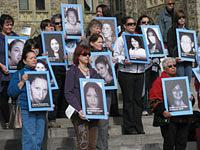Vigils honour murdered and missing aboriginal women
(NC) — Sixteen-year-old Felicia Solomon, originally from Norway House Cree Nation in northern Manitoba, went missing in Winnipeg in March 2003. Her body was found three months later. To date, no one has been charged with her murder.
Solomon was not the first young woman stolen from this family. Her cousin, Helen Betty Osborne, was abducted, raped and murdered in 1971 by four men in The Pas, Manitoba. A provincial inquiry concluded that she had been targeted for acts of extreme brutality because she was an aboriginal woman.
Every year, on October 4, the families of missing and murdered First Nations, Inuit and Métis women and girls hold vigils across Canada to honour the lives of loved ones like Felicia Solomon and Helen Betty Osborne. They are joined by supporters and partner organizations like the human rights movement, Amnesty International, whose 2004 Stolen Sisters report documented the high levels of discrimination and violence experienced by aboriginal women in Canada.
Many Canadians will be shocked to learn that there are no official government statistics on the number of missing and murdered aboriginal women. There are simply too many gaps in how this information is recorded and made public. However, the Native Women's Association of Canada has independently documented more than 600 cases in recent decades, of those that are murdered, missing, or feared dead.
One reason for the shockingly high numbers is a gap in access to basic services. For example, in many communities aboriginal women often have no access to emergency shelters to escape violence. In addition, as the Helen Betty Osborne inquiry concluded three decades ago, there are men who specifically target aboriginal women for acts of violence. Finally, as has been documented by Amnesty International and others, despite the known threats to the lives of these women, police response is all too often slow and inadequate.
Across Canada, aboriginal organizations and the families of missing and murdered women are taking the lead in trying to expose the violence and injustice they face. The October 4 vigils across Canada are a powerful way for people to come out and show their support.
More information on the vigils is available on the websites of the Native Women's Association of Canada (nwac.ca/october-4th-sis-vigils) and Amnesty International (amnesty.ca).
Comments
There are 0 comments on this post













